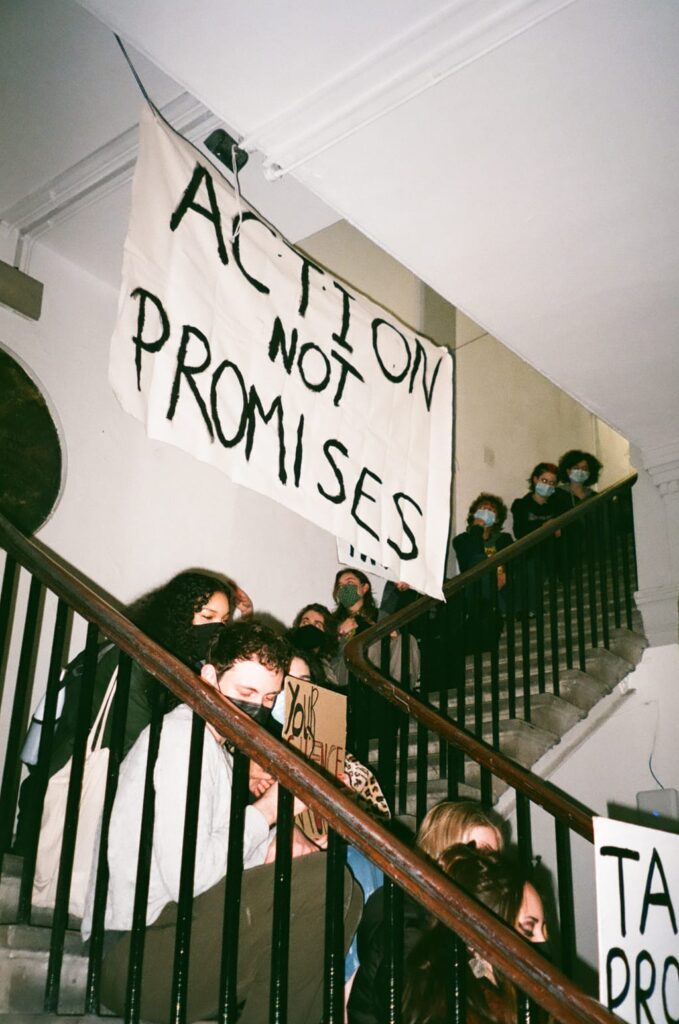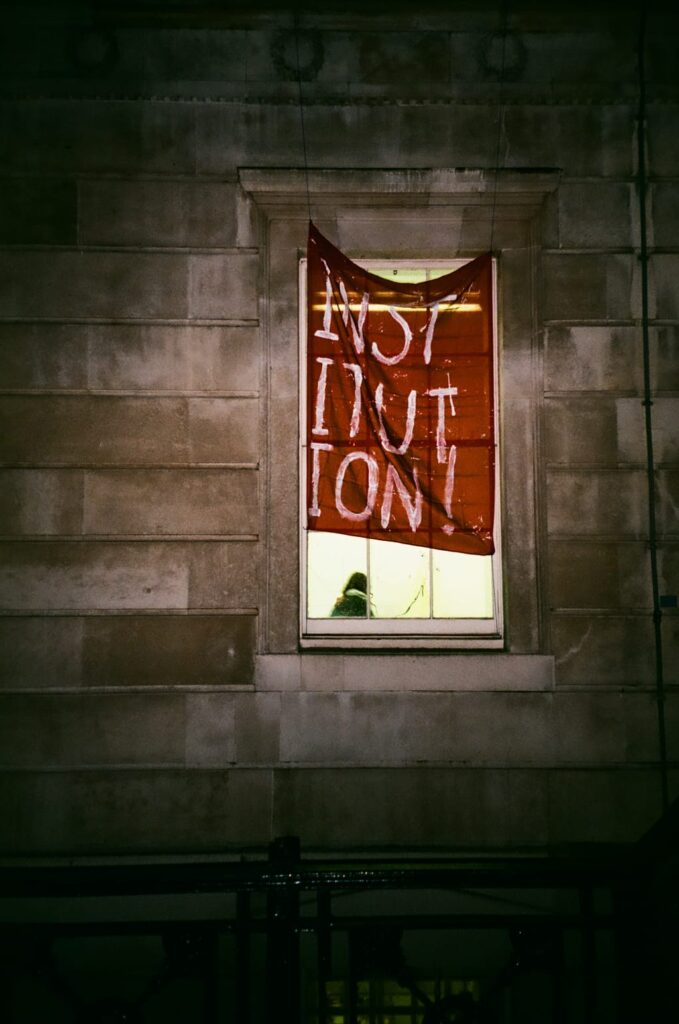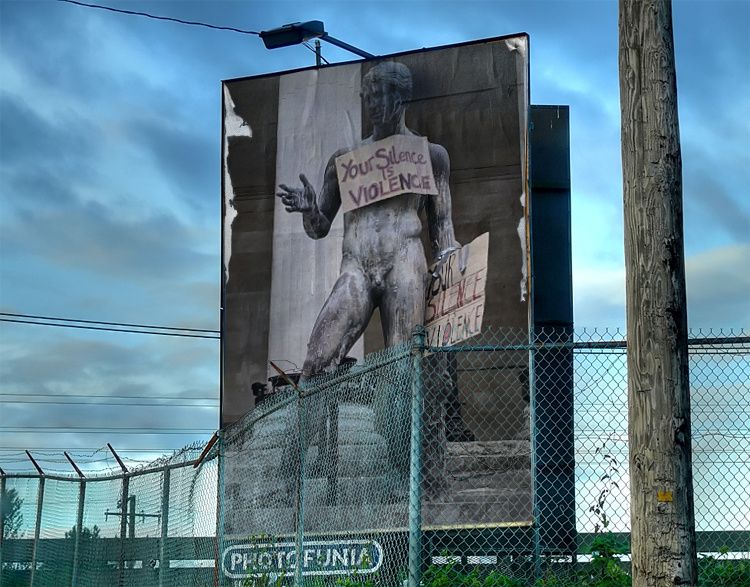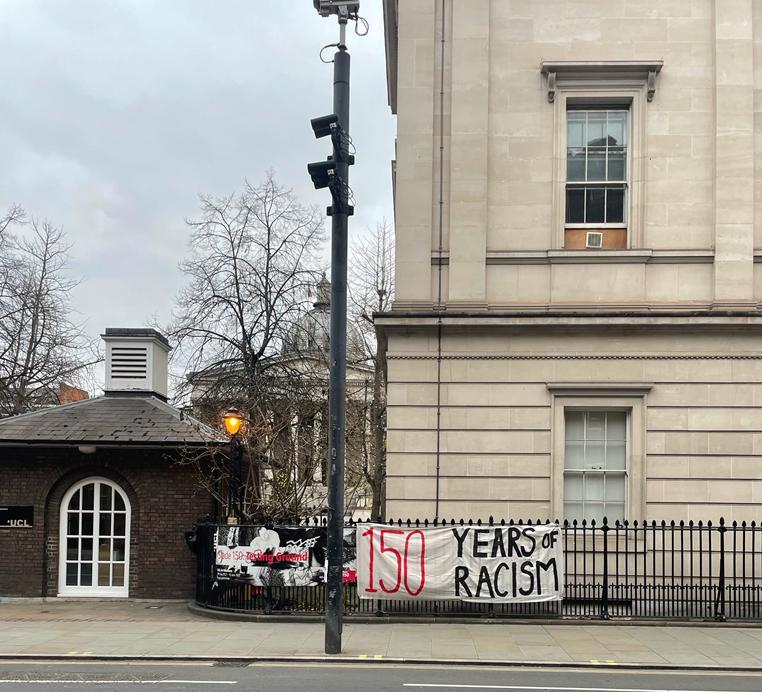SLADE ACTION is a student-led group at UCL’s Slade School of Fine Art, protesting the lack of diversity, inclusion and support at the institution, which it believes cultivates a racist environment, for both the staff and student bodies. On 13th to 17th December, the group carried out a demonstration called #sladeoccupied, in which around fifty students occupied the Slade building. IMOGEN PURKISS spoke to three representatives of the group, who would prefer to remain anonymous, to understand more.
Can you tell us the main aim of the demonstrations? And if there’s one thing you’d want to get across to the wider student body, what would it be?
So there’s actually quite a few aims, but ultimately we want transparency. The occupation was in reaction to a tutor’s resignation, but we’d already been quite aware that there had been issues in the Slade with racism over the past few years – this was sort of the final trigger. About three years ago, there was a protest on issues of racism in the Slade, an all-day thing, but it just feels like there has not been a lot of change since then.
There were quite a few demands, but the main thing is that POC students and staff don’t feel comfortable in the Slade, and UCL needs to admit that there is a problem. There’s a real issue with underrepresentation among staff and the student body, so because of that, there should be much more support. So we’re calling for an independent review of the Slade and UCL has agreed, saying it will start a review before the end of this academic year. This was after a meeting with the Dean (Stella Bruzzi, Dean of Arts and Humanities at UCL), who stated that this issue was already on their agenda before Slade Action issued our demands, but we strongly believe that nothing would have happened if we hadn’t taken action – especially seeing as UCL constantly cite this review as taking a lot of time, but having looked at recent independent reviews at the Bartlett and the London School of Tropical Medicine and Hygiene, it usually only takes a few months. Primarily, we want a reform of the two-tier contract system for staff and an investigation of the interview process, specifically the effectiveness of the bias training for staff.
So the main prompt was actually the tutor’s resignation?
So a POC tutor at the Slade, who the student body greatly valued, resigned in the middle of first term. The day after, a lot of students gathered – which made a change, as this term was still quite online-based at the Slade. Due to Covid measures, we still haven’t had in-person meetings with our areas (i.e. Painting, Sculpture and Media), which usually really contributes to a sense of community across year groups. Students had requested starting these again this term, but that was ignored. So the resignation was actually the first time that a lot of the students informally came back together. We were concerned that the Slade had been talking a lot about institutional racism, but all of it felt performative. So even in instances where they do hire POC members of staff, it’s often on temporary contracts or sometimes not even a contract – just labelled ‘Visiting Tutors’ or lecturers for their Contemporary Art Lectures programme. These all offer the Slade visibility and enhance their prestige, enabling them to say that they’re doing something, but actually inequality is just reinforced by drawing from these staff members’ labour without paying them properly.
I read that, at least, the UCL Security Team were all very nice, during Slade Action’s occupation?
Yeah, they were lovely! On the first night, they came to check in and found us heaters, because they were worried it would be very cold. After our final protest on Friday, I asked one of the Security Team if they were going to take our banners from the Portico down, and he said no – but then UCL did over the weekend.

Do you see this removal of the banners as symbolic of UCL’s perspective on the demonstrations?
Yeah, so we got an email saying it was just part of the general Christmas clean-up that they do after term, but I feel like it was clear that we had left them there for a reason. It was a shame, because the whole point of them being there was to raise awareness: the UCL Quad is such a busy area and people take photos in front of the Portico. The banners represented something happening underneath, but obviously they reflect badly on UCL. In the email to us, UCL stated that they remove ‘all unofficial or out-of-date posters’ from around the campus. ‘Unofficial’ – yes, this was not planned, but ‘out-of-date’ – no, it’s a very present issue.
So can you more fully explain the issues of staff contracts at the Slade?
So I learnt about these issues in the aftermath of the tutor’s resignation, as another tutor was actually making an effort to let students know that this staff member was on a different contract to everyone else – a contract that mainly POC, or younger staff have at the Slade. This contract means that they’re not paid for their research during the summer, which is unfair because to teach, they have to draw from that research. Researching is supposed to sustain their practice so they are able to better teach the students.
Last year, the Slade supposedly reformed the system in order to make it easier for staff to upgrade their contracts, but ultimately, it seems like they just changed the terms for this distinction. So before, I believe that staff were either titled ‘Lecturer’ or ‘Teaching Fellow’, whereas after the reform, everyone was called ‘Lecturer’, but now either ‘Lecturer (Research)’ or ‘Lecturer (Teaching)’ – the latter meaning that they’re not paid for their research. The particular tutor who resigned had been heavily drawing on their research in order to teach students, so they had asked HR to change their contract, but were told many times that it was not possible. Yet the opposite is possible: someone who is researching can downgrade to a teaching contract if they wish.
As the tutors on just ‘Teaching’ contracts are often younger, they tend to be doing research which is more relatable to younger students, and so they often are inundated with more tutorials than the tutors on more permanent contracts. Overall, they have to do just as much teaching as their fellow staff – it’s really not about the number of hours, it is a matter of how much your labour is valued by the institution. So we want a reform of the two-tier contracts system.

Can you explain a bit more about the issues with bias training involved in the interview process at the Slade?
Well, firstly, the bias training is not mandatory for staff, so they’re coming into these interview spaces without a unified understanding across the board. We also want to know: who is leading this training? Is its content constantly under review? The details are not accessible, and again, it comes across as superficial.
Do you feel like these issues cause a wider culture of exclusion, or a hostile culture within the student body itself, too?
There’s a community of people supporting each other at the Slade, but the school’s academic staff are ultimately leading by example. In many instances, they have shown the wrong example, by not stepping in or taking further action when inappropriate comments have been made during crits (where students present work to a group of other students and staff). Often this has been the case because they were the ones making those comments, either essentialising international students’ work to their cultural background, without even having a clear understanding of it – or simply being insensitive to issues of race and colonialism within conversations, by using offensive terminology. And admittedly there is a majority of white students, which will always inevitably feel a bit uneasy for POC students. It can feel quite uncomfortable within the studio spaces, because there isn’t a wider dialogue.
Do you think that feelings of uncomfortability around discussions of race are representative of wider societal hesitancy, or do you feel like this can be specific to the Slade as an institution?
I personally do feel like some tutors at the Slade can find it very difficult to talk about race, and I think this silence is because they feel uncomfortable. But not talking about something because it’s difficult is not good enough. That’s the main principle of Slade Action: transparency, to enable us to have those conversations. It can be tricky to talk about these issues, but this is nothing compared to what POC staff and students have to go through. We really want to open up that dialogue, to make people confront it rather than skirt around the issues.
The Slade is a very small art school, but this tutor’s resignation was never even formally announced – that’s so shameful. The resignation felt very insular – the fact that there was no announcement means that it’s run on student word of mouth, which means it’s hard to get it out beyond the Slade bubble. I’m not even sure if UCL or the Slade have acknowledged that the specific member of staff resigned due to issues of systemic and institutional racism. They’ve emphasised problems of confidentiality in talking about a specific person’s resignation, but here, the nature of their resignation cannot be ignored.
It feels like other art schools, like Central Saint Martin’s or Goldsmiths, are under more scrutiny in the public eye, whereas the Slade doesn’t seem to engage with the media or the public as much, so things seem to go under the radar more. I feel like in the Slade, we often only talk about issues of race in the framework of art, but it actually affects many students and staff personally, outside of art, so we want to address it head on.

It’s really interesting that you mention the framework of art. I’m in UCL’s History of Art Department, and it’s constantly apparent that there are significant issues around diversity and underrepresentation within the wider art world. Does the Slade make any efforts to help underrepresented students get into the art industries?
No. It’s interesting, because there are a lot of grants and awards which seem weirdly secretive – we don’t really get much information on them. It seems that it’s often more based on tutors awarding them after merely seeing a student’s work – you don’t apply for them. We are not provided with information on them, you can look them up but it doesn’t seem easily accessible. So even with the funding, it can seem quite elitist; it seems like often it’s awarded to painting students. Some individual tutors may take the time out to email you information about the grants, but it’s not stated as their duty. Not all the tutors do it, and I’ve found it’s often not the tutors who are in more permanent positions. In terms of post-university opportunities, there’s not loads of support from the institution unless you personally contact individual tutors, which again, is asking for an unpaid effort on their end.
How has your personal perception of the Slade changed since you enrolled? Would you discourage people from attending?
I think it can feel nice at the Slade because it’s small. But it’s meant to be one of the top art schools worldwide and it doesn’t feel that different to others. It can be quite old-fashioned, which I feel like may stem from it having been around for so long – it has this baggage of history. I think it’s struggled to become more progressive, to come into the future – even the present.
I feel like what drives its popularity is the work of students, but I feel as though the institution itself doesn’t necessarily reflect that push to the present. I think, as a Person of Colour, I would only tentatively recommend it, because of the hesitancy to even discuss the support available to POC staff and students.

As you guys have mentioned, these issues of POC underrepresentation and lack of support are definitely not restricted to the Slade. Have you considered widening the demonstration?
Yes, this experience is not just limited to current students. We’ve received so many messages from Slade alumni supporting our cause. We also know how prevalent these issues are across UCL. But across UCL, there’s definitely a lack of interdepartmental communication, even amongst the EDI (Equality, Diversion and Inclusion) committees. Slade Action is an opportunity for people to come together, not through a controlled departmental framework.
We still want to continue challenging these issues after the holidays, so we’re definitely open and keen to engage with other departments too. We want to open the dialogue to make it more of a movement.
We’re really excited to find new ways of protesting – even with the banners, we were being creative. We’re exploring the different media we can use, like photo manipulation, in order to take it out of the UCL buildings into the public realm. Our online presence, especially on Instagram, is key for this.
If anything, this demonstration has shown us that we don’t need to wait for permission. This year, for instance, we were told that we aren’t allowed to have a film screening without handing in a risk assessment. As Slade becomes more bureaucratised, we feel like we’re being infantilised. This occupation showed us that we do not have to accept it, we are fully aware of what we’re doing, and we will continue to do it because we believe it is important.
For more information on Slade Action and how to get involved, see the group’s Instagram.





